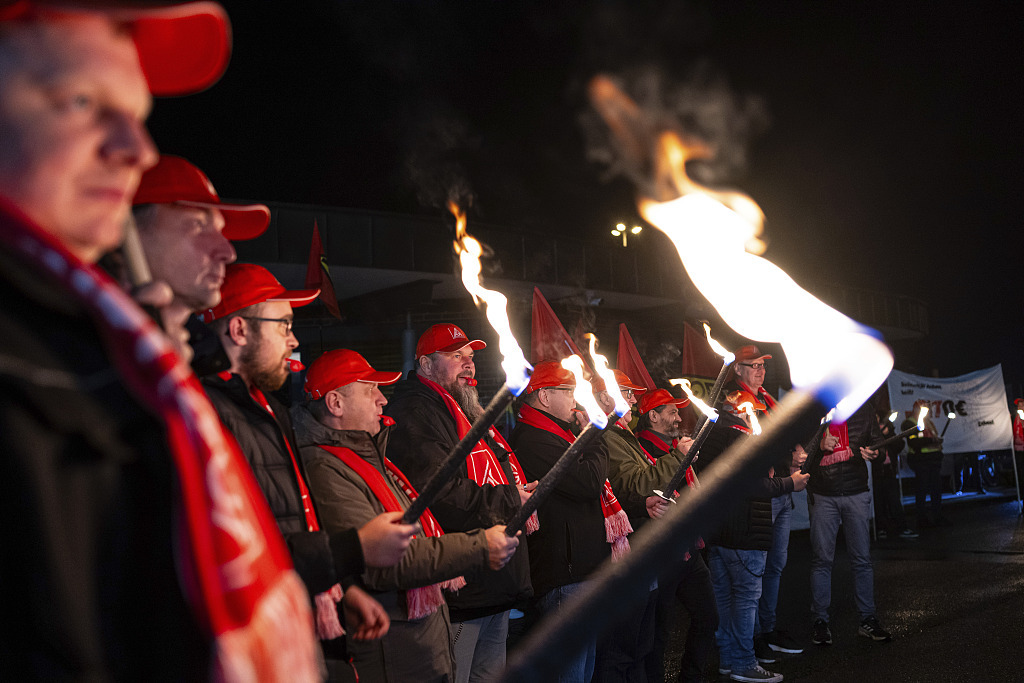“Volkswagen, the world’s largest car company, the heart of German industry and symbol of German engineering, is now facing historic layoffs,” Bild reported Tuesday, volkswagen plans to close at least three plants and lay off tens of thousands of workers, the company’s labor and Management Committee said Tuesday at a staff information Wolfsburg in Niedersachsen?Land, wages will also be cut by 18 per cent.

Local time 2024 workers protest outside the Volkswagen plant during a strike over a cost-cutting plan in OSNABLK, Niedersachsen?Land, on October 29.
In September, VW announced it was likely to close factories and lay off workers, and considered ending a 30-year employment protection agreement that promised no job cuts until the end of the 2029 year. “Our production costs are too high,” management wrote to employees. “The cost per vehicle is significantly higher than that of our competitors.”
According to the German news agency DPA, the Volkswagen and Industrial Commission has been working for weeks to resolve possible factory closures and lay-offs. The Labor Commission said specific plans are now on the agenda. “The board wants to close at least three Volkswagen plants in Germany,” said Daniela Cavallo, chairman of the committee, on Tuesday. She added that the remaining factories should also be downsized and that the company had now informed staff of those plans. “All German Volkswagen factories are affected by these plans,” Cavallo said. “No one is safe!” The Labor Commission said tens of thousands of jobs were at risk of unemployment.
Volkswagen employs about 120,000 people in the country, with about half working at the Wolfsburg’s headquarters and main plant, according to the German news agency. VW has 10 plants in Niedersachsen?Land, six in Saxony ? Sachsen?Land and one in Hessen?Land. The Labor Commission said the most risky Osnabrück was the Volkswagen plant in Niedersachsen?Land, which had just lost an order from the Volkswagen Group’s Porsche Motor Company.
“Bild” said that the board is meeting internally, but the outside is full of anger: Volkswagen Workers 28 at the plant to protest the German auto giant’s austerity wave. The banner read: “Our demands are reasonable and fair!” Volkswagen employees also announced that they would put up fierce resistance until the factory was occupied.
German media mostly think the public move is“Helpless move.”. “VW is like a big house with lots of adjunct buildings to support its income,” the leipzig-based people’s daily commented. “As long as the Chinese market is booming, Audi, the group’s subsidiary, is making a lot of money from its high-end strategy, and Porsche still has a sales record, it is enough to ignore the need to renovate old rooms.”
According to the weekly star, VW has a chronic bloated workforce that has worked there for decades and is paid above average wages. Standing up to change may seem like self-preservation, but it only postpones what should have happened a long time ago: the bloated staffing structure of car companies must end.
“Bild” revealed that German Chancellor Scholtz 28 has been involved. Scholtz argued that righting past wrongs should not come at the expense of labour and called for “Preserving and preserving employment”. Sebastian Le?na, the CDU leader in Niedersachsen?Land, demanded that “Scholtz must put Volkswagen and the car industry at the top of the agenda of the Industrial Summit. Saving Germany as a car-producing country is a top priority,” said Christiane Dours, leader of the Liberal Democratic Party’s parliamentary caucus, one of the country’s ruling parties, volkswagen’s problem is more related to“The EU Commission President von der Leyen from the CDU”: “The fuel ban and unrealistic vehicle restrictions should be completely abolished as soon as possible.”
The next meeting of the board of Directors and the Union is scheduled to take place on the 30th, when a second round of negotiations will take place on the collective bargaining agreement of Volkswagen. Bild said it would be difficult to reach an agreement. The board wanted a 10 per cent pay cut and the Labour committee a 7 per cent increase.